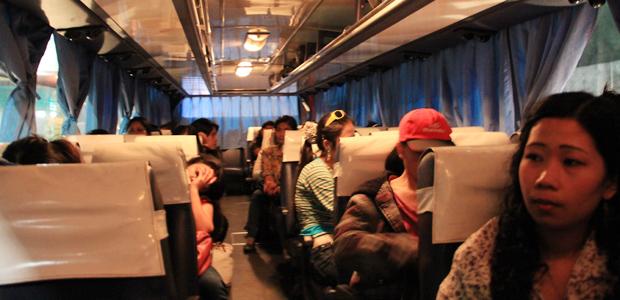Filipino domestic workers flee war in Syria, return home to no work
Mary Ann Lagahet and other women who just returned from Syria catch a ride on a bus from the airport to the Philippines reintegration center. (Photo by Aurora Almendral.)
At Ninoy Aquino International airport in Manila, 85 Filipina women walk through the gate.
They’re coming off the last leg of their journey back from Syria.
Two years into the war in Syria, thousands of women from the Philippines are still working there as domestic servants.
Mary Ann Lagahet, who is 27, arrived in Damascus in early 2011, just before the start of the uprising. She finally got out when her contract ended. Today, she looks exhausted.
“I’m grateful to be back safe in the Philippines,” Lagahet said. But her sister is still in Damascus, and she’s hoping the Philippine embassy there can get her out soon.
“We have repatriated about 4,100 household service workers,” said Carmelita Dimzon, head of the Overseas Workers Welfare Administration, which works with the Philippine Department of Foreign Affairs to bring Filipino workers back from wars and disasters. Dimzon says there are still about 2,000 to 2,500 Filipina workers in Syria.
Jennifer Baculpo got back a year ago. She worked as a maid in Latakiya, in Syria’s north. When the war started, she says her employer told her the sounds outside were just fireworks.
“But I’m not stupid,” Baculpo said. “I know gunfire when I hear it.”
When the fighting got bad in Latakiya, her employer moved the household to Damascus. But the war caught up with them. Baculpo heard shots, she heard a car bomb go off down the street, and she saw burnt cars and bodies. She says wasn’t allowed to watch TV, but when her employers left the house, she would switch it on to watch the news.
Baculpo says she spent all day cleaning, washing the dishes, and taking care of the kids, sometimes from 6 a.m. until midnight. Then she would lie in bed listening to demonstrators chanting until dawn.
“I kept thinking I need to go home, or I’ll die here,” Baculpo said.
It’s been difficult to get domestic workers like Baculpo out of Syria, Dimzon said.
“Employers resisted. They did not want to release them,” she said.
Sometimes employers demanded that their maids pay them back for the cost of bringing them to Syria. Baculpo’s employer did that at first, but Baculpo insisted, and after several months, they gave in.
Once she was let go, Baculpo stayed at a dorm at the Philippine embassy, which was filled with other Filipinas trying to get home. She recalls that one of the women there was verging on hysteria.
“If she heard even a bang, that’s it, she starts screaming. She was really delirious,” Baculpo said. “They told me don’t pay any attention, Jenny, just let her be. I said why? What is going on? They told me she’s lost her mind — because of what her employer did to her, and because of the war.”
Baculpo lived in the embassy for a month and a half before the Philippine government flew her home. But one of her friends, a woman named Faihirine, is still in Syria. Faihirine told her she wants to stay in Damascus as long as she can stand it, because there’s no work for her in the Philippines.
When Baculpo got home, she thought she would never again work overseas. But she hasn’t been able to find steady work in the Philippines. She lives in a tiny, two-room cement-block house in Manila with her parents, sisters and her kids. There’s no running water or electricity.
Her son plays with rocks outside while the neighbor girls sing songs to each other.
In Syria, she earned $200 a month. It wasn’t enough for her family to live on, but it’s more than they can scrape together now. They’re surviving by eating vegetables that they grow in a nearby plot.
And Baculpo says she is worried she can’t afford her kids’ school supplies.
“If I don’t go overseas,” she says, “this is how our life is, really hard.”
Now Baculpo is looking for another job overseas, for her kids’ sake. While she won’t go back to Syria, she says she’ll take her chances in whatever other country offers her work.
Every day, reporters and producers at The World are hard at work bringing you human-centered news from across the globe. But we can’t do it without you. We need your support to ensure we can continue this work for another year.
Make a gift today, and you’ll help us unlock a matching gift of $67,000!
